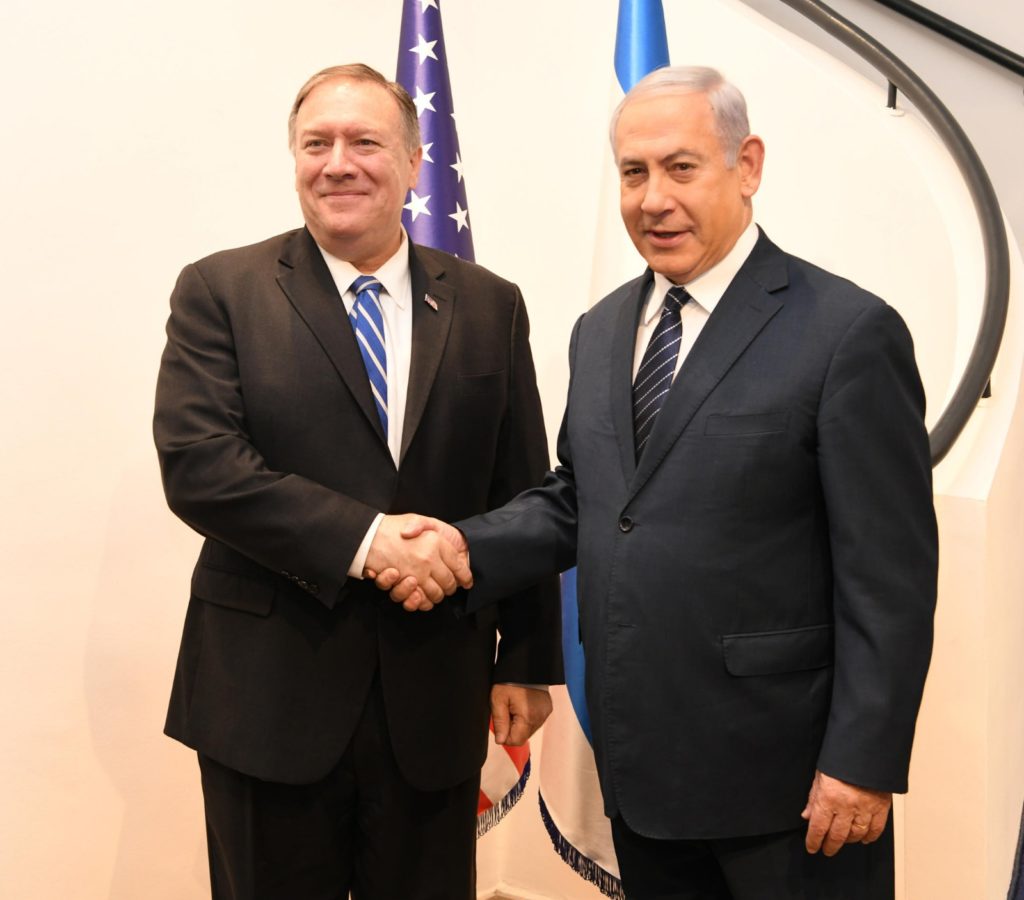
It’s been less than two weeks since Israel and the United Arab Emirates announced their stunning peace treaty, and the United States is already moving to help along another potential peace treaty between Israel and an Arabic-speaking nation. US Secretary of State Mike Pompeo is visiting Sudan this week, according to a State Department press release, where he will meet with the Sudanese officials “to… express support for deepening the Sudan-Israel relationship.”
The meeting with Prime Minister Abdalla Hamdok and Sovereign Council Chair General Abdel Fattah el-Burhan comes the same week Pompeo is set to visit Israel and speak with Prime Minister Benjamin Netanyahu to discuss “establishing and deepening Israel’s relationships in the region.” Pompeo will also visit Bahrain and the UAE, in the latter of which he will talk about the historic Abraham Accords signed with Israel.
The high profile visit from the top American diplomat comes as Sudan has sent conflicting signals about their immediate openness for peace with Israel. On Friday, the Arabic newspaper Al-Araby Al-Jadeed reported that the chief of Israel’s Mossad spy agency—Yossi Cohen—had met with the Vice Chairman of the Sudanese Sovereignty Council and Commander of the Rapid Support Forces, Muhammad Hamdan Dagalo. The meeting, according to a Google translation of the Arabic report, was reportedly arranged by the UAE and highlights reported interest by the Sudanese military in ties with Israel.
However, the report also said the spokesman for the Transitional Sovereignty Council in Sudan denied the meeting happened. The contradictory accounts mirror the recent public comments in support of peace with Israel by Sudanese Foreign Ministry spokesman Haidar Badawi Sadiq, who was soon thereafter fired from his post.
Regardless of whether or not Sudan is ready for peace with Israel in the near future, someone apparently is. Israeli Ambassador to the US Ron Dermer was interviewed by the Al Arabiya newspaper and said that there are “several countries” where there are “possibilities” for peace and Israel hopes to see “another breakthrough… in the weeks, and months ahead.”
The UAE-Israel peace deal was achieved with a surprising level of secrecy and follows extensive efforts by the US to mediate Middle East peace. While Israel did not agree to any territorial concessions to the Palestinians in public comments about the UAE deal, the Israelis did agree to “suspend” efforts to declare sovereignty over Jewish communities in the Biblical heartland of Judea and Samaria. Instead, Israel will “focus its efforts now on expanding ties with other countries in the Arab and Muslim world,” according to the joint Israel-UAE-US statement on August 13, published to the White House website.
While Pompeo is set to discuss regional peace with Sudan and the UAE, that isn’t his only purpose in visiting the region. The State Department statement said the American official also planned—among other topics—to talk with Netanyahu about “regional security issues related to Iran’s malicious influence.” The anticipated discussions come after the US announced efforts to “snapback” extensive sanctions on Iran for violating the international nuclear deal signed in 2015, known as the Joint Comprehensive Plan of Action (JCPOA).
While there has been international pushback against the Americans for the sanctions approach, Netanyahu expressed his enthusiastic support last week, calling it the “right decision.”
“The fatal flaw in the JCPOA are the so-called sunset clauses. I urged the P5+1 not to agree to a framework which automatically lifts the restrictions on Iran and the sanctions on the regime’s import and export of armaments, its missile program and its nuclear activities,” said Netanyahu in comments released by his office.
“The Security Council’s failure to act was a dereliction of its duty to protect international peace and security. Unchallenged, this failure effectively makes the Security Council complicit in arming Iran’s murderous regime.”
Highlighting a key agreement between Israel and other Middle East nations at a time when peace deals are being discussed, Netanyahu said “many leaders” in the region concurred with Israel to oppose the JCPOA.
“Fortunately, President Trump and Secretary Pompeo have refused to accept this [situation],” said Netanyahu. “…Israel stands proudly and firmly with the United States, as do governments across the Middle East who opposed the JCPOA quietly and now support the restoration of sanctions publicly. Ultimately, the tyrants of Tehran must understand this: If Iran wants to be treated like a normal country, it must start acting like a normal country. That has not yet happened.”
(By Joshua Spurlock, www.themideastupdate.com, August 23, 2020)
